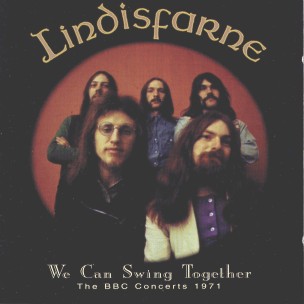| We can swing together (1998) |
|
|
 |
| We can swing together (1998) |
|
|
 |
1. City Song Alan Hull 4:44 2. Train in G major Rod Clements 3:23 3. Lady Eleanor Alan Hull 5:09 4. Fog on the Tyne Alan Hull 4:51 5. Knackers Yard Blues Rod Clements 4:36 6. We can swing together Alan Hull 8:29 7. Together Forever Rab Noakes 3:04 8. No time to lose Alan Hull 3:33 9. January Song Alan Hull 4:21 10. Lady Eleanor Alan Hull 4:48 11. Meet me on the corner Rod Clements 3:08 12. Train in G major Rod Clements 3:24 13. Fog on the Tyne Alan Hull 4:35 14. Jackhammer Blues Woody Guthrie 4:46 Tracks 1-6: John Peel in concert 18. July 1971; Tracks 7-14: BBC In Concert 7. Dec. 1971
Project Coordinators: Trevor Jones, Becky Stewart and Beccy Ryan for NMC.
Mastered at Black Noise by Jolly.
The "New Millenium Communications" Website: www.n-m-c.co.uk
We can swing together, according to Dave Hill, "the band had little or no control over those issues". Maybe that's the explanation why not even the given numbers of tracks or session dates matches between the booklet and the sleeve/CD (see below), although the author's name listed is Ray Laidlaw.
Album Cover Info
The tracks on this album were all recorded by te BBC during 1971, the first seven at a "John Peel Concert" on the 24th June [what differs from sleeve info !] and the final ten [? actually there are only 8 instead of 10 !] at an "In Concert" which took place on the 7th of December.
The material featured was the core of Lindisfarne's then current live show and the resulting recordings are typical of the band's sound and spirit during 1971 when the Lindisfarne line-up was Alan Hull on vocals, guitar and keyboards, Rod Clements on bass, slide guitar, violin and occasional vocal, Ray Jackson on vocals, harmonica and mandolin, Simon Cowe on vocals, guitar and mandolin and myself, Ray Laidlaw on drums.
Quite a number of the songs featured on this album were destined to appear on the chart-topping "Fog On The Tyne" album which had not yet been recorded when these concerts were broadcast. Consequently, many of the song arrangements are subtly different from the finals versions.
Most of the BBC's live rock shows were presented from the Paris Theatre on London's Lower Regent Street which was a cosy, basement venue, well suited to Lindisfarne's music. The theatre had previously been the setting for many classic BBC comedy programmes, including the Goon Show, and Lindisfarne being big fans of radio comedy, relished the good vibes that the theatre retained. The audience for these concerts were an enthusiastic bunch and as the recordings took place on a fairly regular basis, a club atmosphere was maintained which helped relax both the performers and technicians. The shows were recorded live with no repairs. Between song announcements were made by the host while Lindisfarne scurried around the stage changing instruments and swigging pints of Guiness. The final results were concerts brimful of top songs performed by a band just beginning to realise their enormous potential. You should have been there.
Ray Laidlaw 1998